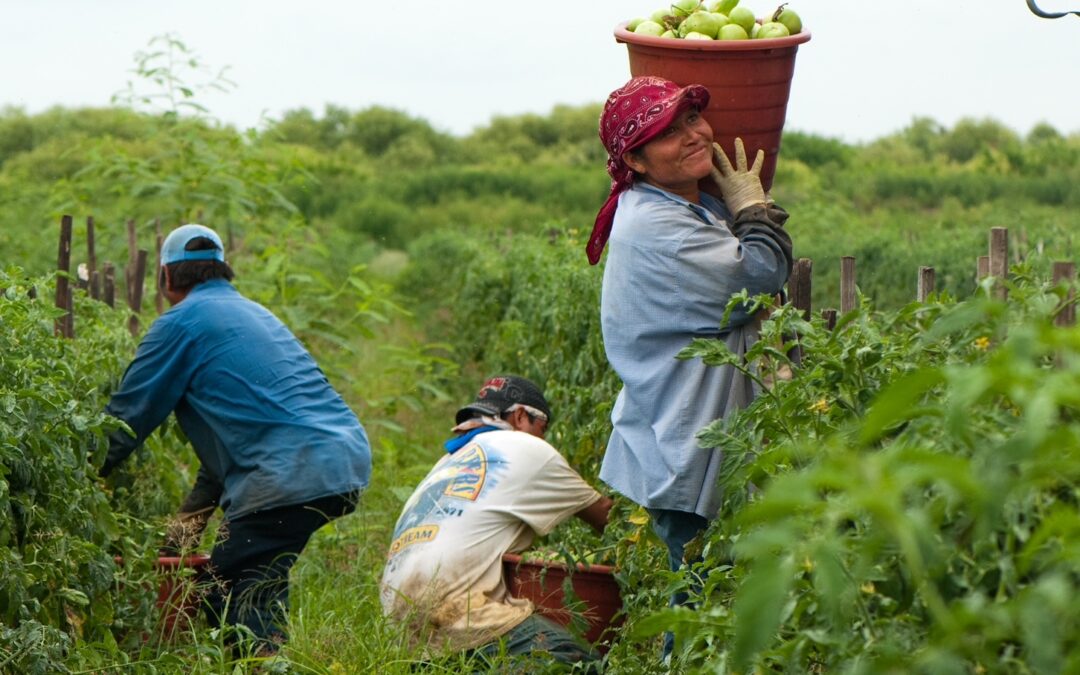
Dec 10, 2021
Millions of workers around the world engage in paid labor—yet do not receive their wages. In addition, getting employers to pay workers what they are owed often is difficult—especially for those who have migrated for work, according to a new report from the Migrant Justice Institute.
“All of the risks and costs of wage recovery are placed with the party least able to bear them: the migrant worker,” says Laura Berg, co-executive director of the Migrant Justice Institute and co-author of the report, “Migrant Workers’ Access to Justice for Wage Theft.”
The report draws on a year of global consultations and analysis across all regions, identifying common drivers of wage theft to propose specific, practical reforms that can underpin global, national and local wage theft campaigns. It is co-authored by Migrant Justice Institute Co-Executive Director Bassina Farbenblum.
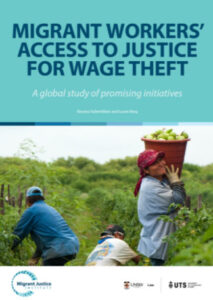 Wage theft—which also includes being paid less than the minimum wage, or not being compensated for overtime or sick leave—increased during the COVID-19 pandemic, especially for migrant workers who were required to return to their home countries at the start of the pandemic and who then had no recourse for obtaining their unpaid wages.
Wage theft—which also includes being paid less than the minimum wage, or not being compensated for overtime or sick leave—increased during the COVID-19 pandemic, especially for migrant workers who were required to return to their home countries at the start of the pandemic and who then had no recourse for obtaining their unpaid wages.
But the magnitude of wage theft prior to the pandemic makes clear it happens by design.
“Wage theft is not just the result of a few bad employers. It’s part of a business model in many supply chains,” said Elizabeth Frantz at the Open Society Foundations. Frantz moderated a Migrant Justice Institute virtual panel December 7 to launch the report. (Watch the full event here.) OSF funded the report and virtual panel.
Speaking at the event, Jill Wells, with Engineers Against Poverty, described how a complex system of supply chain contracting in Qatar, where she worked on construction for the 2022 World Cup, often led to wage theft for migrant workers. Without laws and enforcement mechanisms to ensure migrant workers get compensated, even private organizations can only go so far to assist migrant workers, said Ben Harkins at the International Labor Organization (ILO), which has established Migrant Resource Centers in several Asian countries.
“Let’s be clear—this is not just a simple issue of wage arrears as many try to classify the issue, as if it’s just a clerical error. This is theft. And it’s outrageously common and getting worse during the pandemic,” said Solidarity Center Executive Director Shawna Bader-Blau, who took part in the panel. The Solidarity Center and the International Lawyers Assisting Workers (ILAW) network supported the report and organized the regional consultations.
Holding Employers Accountable, Expanding Labor Laws
A big barrier to accessing justice is migrant workers’ fear of employer retaliation. “Most migrant workers are unlikely to file a claim because they fear being deported, losing their job or other forms of retaliation,” the report says.
Although the report finds no single solution will ensure migrant workers receive their due compensation or can access justice if they do not, it details measures government officials and employers should take. For instance, migrant workers should receive permission to stay in country to pursue wage claims. If they return home without pay, they should be able to lodge wage claims through video testimony or online courts.
Because the system generally favors employers, migrant workers are forced to prove their claims, and it is extremely difficult for migrant workers to provide evidence of their work and the unpaid wages. The report recommends shifting the burden of proof to employers with legal presumptions in workers’ favor regarding duration of employment hours worked, wages owed and so on.
Holding employers accountable also is essential. “Employers facing a wage judgment simply liquidate or refuse to pay. They won’t be held responsible by suppliers or contractors,” said Berg. The report lists options for enforcing a determination and collecting payment, such as holding licensing of employers, deregistering a business and suspending orders until workers receive what they are owed.
Freedom to Form Unions Key to Migrant Worker Rights
Governments must extend labor law coverage to all workers, according to the report. Most migrant workers are not protected by labor laws, which establish minimum wages, job safety and health guidelines, and social protection coverage like paid sick leave and time off. And, most migrant workers are prohibited from forming unions to collectively champion decent working conditions.
The most marginalized workers are especially vulnerable to wage theft, and debt incurred when they are unpaid renders them vulnerable to forced labor, said Franz.
“This study focuses on initiatives by governments and state actors, but recognizes that often those mechanisms just aren’t enough,” said Bader-Blau. “To truly recover stolen wages and ensure migrant worker justice, this has to be combined with collective action of migrant workers around the world.”
Fundamentally, says Bader-Blau, “We must continue to support freedom of association, the right to organize and collectively bargain for all workers regardless of their nationality, gender, sector or immigration status as the primary mechanism to prevent and address rampant wage theft of migrant workers.”
Says Frantz: “It’s clearly time for business and government to recognize that it is ethically unacceptable to let the risks and burdens of wage recovery lie with migrant workers rather than business and government.”
Panel participants also included Terri Gerstein from the Harvard Labor and Worklife program; Douglas Maclean, Justice Without Borders; and Apolinar Tolentino, Building and Wood Working International.
The report is part of an ongoing global campaign titled Justice for Wage Theft organized by Building and Wood Workers’ International (BWI), Migrant Forum in Asia, Lawyers Beyond Borders Network, Cross Regional Centre for Migrants and Refugees, South Asia Trade Union Council (SARTUC), ASEAN Services Employees Trade Union Council and the Solidarity Center.
Nov 5, 2021
Dave Welsh, Thailand director for the Solidarity Center, noted: “Sawit has been out front and extremely impactful in his work to welcome and integrate migrant workers into the Thai labor movement. Given the political sensitivities within the government and the business sector around providing rights to migrant workers and Sawit’s strong role in advocating for them, there is no doubt there is a link between his advocacy for migrant workers and the legal harassment he has faced over the past decade.”
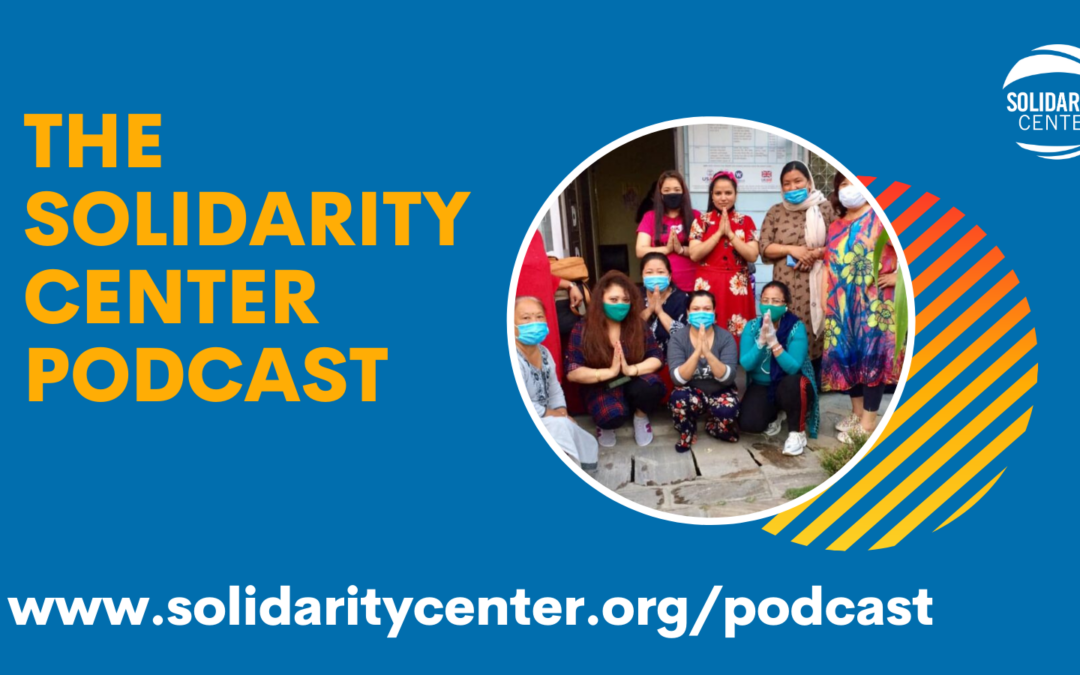
Mar 24, 2021
Migrant workers worldwide have been especially hard hit in the pandemic, suffering reduced pay, lost jobs and little access to social support programs like unemployment insurance. In Thailand, migrant rights groups estimate that since COVID-19, 700,000 workers are either unemployed or not receiving full pay.
But as migrant rights attorney Preeda says on this week’s episode of The Solidarity Center Podcast, Thai unions are standing up for migrant workers, helping them organize to better advocate for their rights and negotiate with their employers to improve working conditions. And, throughout the COVID-19 crisis, unions have helped connect jobless migrant workers with aid organizations and other vital support.
“Before the pandemic of COVID-19, we already connected with the labor unions, especially for those sectors that have migrant workers in the workplace,” Preeda tells host and Solidarity Center Executive Director Shawna Bader-Blau. “We can work with the Thai partners and the unions to continue to promote labor rights and human rights in Thailand. We help and ensure that the workers get respect.”
Billions of Us, One Just Future
 The Solidarity Center Podcast, “Billions of Us, One Just Future,” highlights conversations with workers (and other smart people) worldwide shaping the workplace for the better.
The Solidarity Center Podcast, “Billions of Us, One Just Future,” highlights conversations with workers (and other smart people) worldwide shaping the workplace for the better.
Be sure to catch last week’s episode in which Bader-Blau talks with worker rights advocates in Belarus and Brazil about how workers are standing up for their democratic freedoms in repressive regimes.
Join us for a new episode each Wednesday on iTunes, Spotify, Amazon, Sticher or wherever you subscribe to your podcasts.
SOLIDARITY CENTER PODCAST SCHEDULE
- April 7: Francia Blanco, a domestic worker and trans rights activist reaching marginalized workers through her all-trans domestic workers union
- April 14: Adriana Paz, an advocate with the International Domestic Workers Federation who understands firsthand the power of unions in ensuring domestic workers have safe, decent jobs
- April 21: International Trade Union Confederation President Ayuba Wabba, who explores the Nigerian labor movement’s response to the COVID crisis on workers and discusses the global labor movement’s plans to build back better for workers around the world
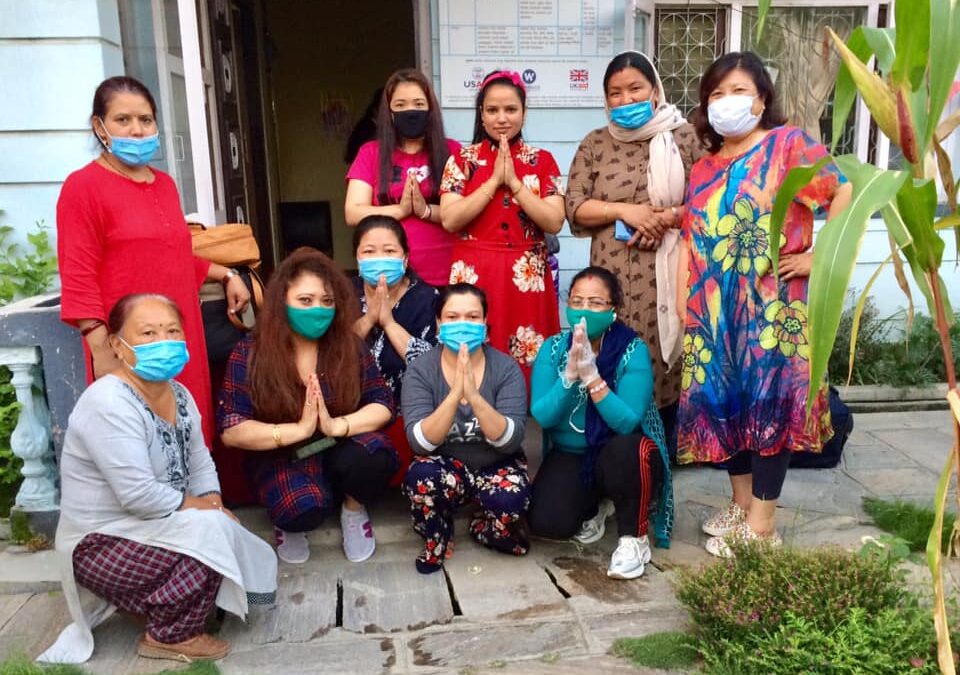
Dec 3, 2020
Globally, marginalized workers have been especially hard hit by the novel coronavirus. Migrant workers in particular have experienced some of the harshest effects of COVID-19 and the related lockdowns, quarantines and travel restrictions.
Yet while the world has recognized “the bravery of frontline workers,” many of whom are migrants, “we must now turn that celebration into something that is meaningful and not just ephemeral,” says United Nations Secretary-General António Guterres.
We must ensure “fair and ethical recruitment, decent work, and access to health care and social protection without discrimination. It is also critical we promote financial inclusion of migrants and their families. We must address discrimination … migrants must not be stigmatized or denied access to medical treatment and other public services.”
Guterres spoke during release of the first UN Secretary General’s report on the Global Compact for Safe, Orderly and Regular Migration. Adopted in December 2018, the Global Compact sets out a cooperative framework for achieving safe, orderly and regular migration within a rights-based framework, and includes a process for implementation and review.
The report, part of the UN review process, focuses extensively on the effects of COVID-19 on the world’s 272 million migrants and the guidance the Global Compact offers in addressing the adverse effects on migrant workers.
Fewer Protections for Migrant Workers Under COVID-19
As borders and worksites were shut early this year, millions of migrant workers were stranded around the world, many trapped in crowded housing with no access to support, including access to food and other life-sustaining provisions. Many migrant workers were systematically denied social safety net protections like unemployment benefits or other forms of income support.
Others were forced to work in unsafe conditions, suffered from wage theft, and retaliation for speaking out about abuse. Origin countries frequently lack adequate health infrastructure, exposing those who returned to a greater risk of contracting COVID-19, or making it difficult for those who were infected to find care. Migrants returning in these conditions are also particularly vulnerable to exploitation, violence, stigma, discrimination and, without jobs, may be unable to support themselves or their families.
Although some governments took positive steps to voluntarily return migrant workers, according to the Global Compact report, many imposed even harsher restrictions. “The pandemic has been used by some [countries] to justify the increased and discriminatory use of immigration detention and to deport migrants without due process,” the report said.
The COVID-19 crisis also has worsened the situation for migrants in countries where they work. In Central Asia, the COVID-19 pandemic “exposed structural and institutional flaws in the way migration is managed in the region,” making conditions for migrant workers dire, according to a shadow report on implementation of the Global Compact in the Central Asian region. The shadow report cites such structural flaws as lack of work contracts that result in wage theft, no regulation of work hours and little or no access to health care or other social and legal protections. It was submitted to the UN by the Solidarity Center, the International Labor Initiatives (ILI), Insan Leilek and the Kazakhstan International Bureau for Human Rights.
The pandemic is especially hard on women, including the 8.5 million migrant women in domestic work, as well as lesbian, gay, bisexual, transgender and intersex migrants, the Global Compact report finds. Even as domestic violence is increasing during the pandemic, resources are being redirected away from sexual and reproductive health services. The Global Compact report points to the need for a gender-responsive, rights-based approach to migration all the more necessary.
Remove Barriers that Repress Migrant Workers’ Full Potential
Rooted in the UN Declaration of Human Rights and internationally agreed standards and frameworks, the Global Compact is grounded in rights-based policies and is a “call to build comprehensive, rights-based policies to ensure that migrants and their communities can thrive,” according to the report.
As such, “legislation should provide for ensuring the rights of migrants in accordance with international human rights standards, including fair and safe working conditions, the right to good rest, the right to access jobs without discriminatory procedures for obtaining the right to work,” according to a shadow report from Russian unions to the UN. “We believe that receiving countries should provide regulatory and visa flexibility for workers, especially during a pandemic.”
Noting the urgency for greater cooperation across borders during the COVID-19 crisis, including the integration of public health concerns into rights-based border governance, the Global Compact report recommends that member countries implement measures and practices in response to COVID-19 that ensure an inclusive public health response to suppress the virus and restart economies, protect migrants’ human rights and ensure the availability of lifesaving humanitarian assistance.
The report’s recommendations support the UN’s June 2020 Policy Brief: COVID-19 and People on the Move, which states that “the best way to recognize the important contribution made by people on the move to our societies during this crisis is to remove barriers that inhibit their full potential.
“This means facilitating the recognition and accreditation of their qualifications, exploring various models of regularization pathways for migrants in irregular situations and reducing transaction costs for remittances.”
Ultimately, as the report states: “The COVID-19 crisis presents an opportunity to reimagine human mobility for the benefit of all while advancing the central commitment of the 2030 Agenda to leave no one behind.” The report is in line with calls from the global labor movement, led by the International Trade Union Confederation, for a new social contract “between workers, government and business, which should include a floor of a universal labor guarantee for all workers.
“Implementing a New Social Contract would make sure that that rights are respected, jobs are decent with minimum living wages and collective bargaining, social protection is universal, due diligence and accountability are driving business operations, and that social dialogue ensures just transition measures for climate and technology.”
In short: A new social contract must include all workers, including migrants.
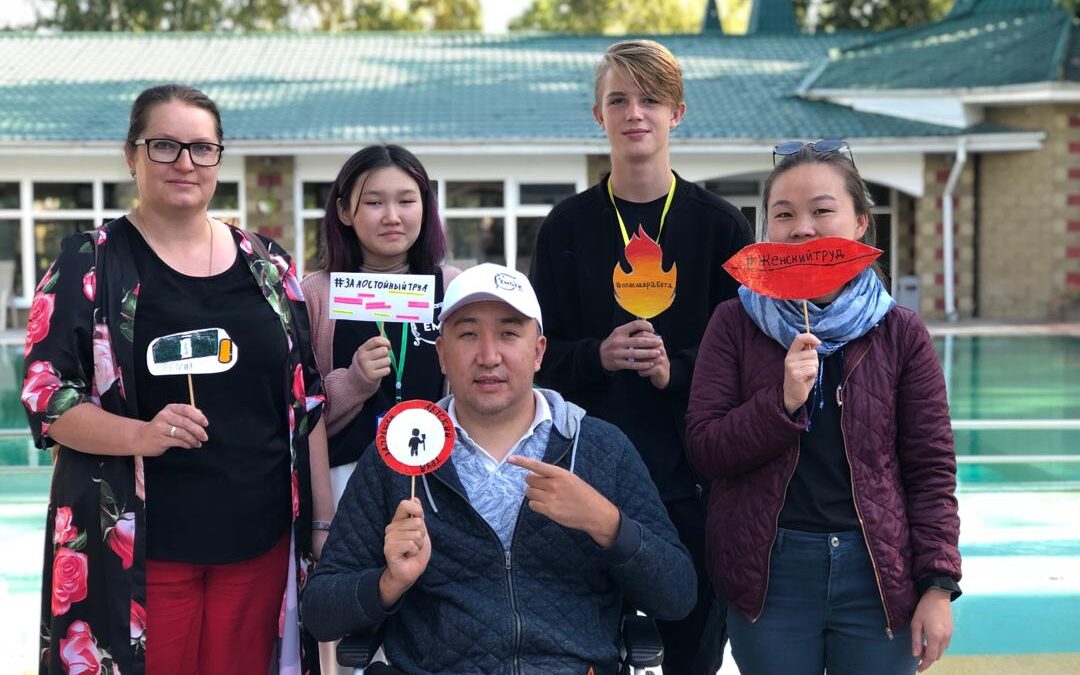
Sep 21, 2020
To promote youth civic engagement and the fair employment of women, workers with disabilities and those migrating outside the country to earn a living, the Solidarity Center’s second annual School of Young Leaders in Bishkek educated dozens of young people in mid-September about their protections under the country’s labor code, with a special focus on disability rights. Event attendees—selected from around the country based on a writing competition—included youth and mentors with disabilities.
“This is my first experience in the framework of an inclusive society—where no one divides into some groups, everyone supports each other, accepts each other equally and shares their experiences,” said Sezim Tolomusheva, organizing and socioeconomic protection lead specialist for the Union of Textile Workers of Kyrgyzstan.
During a session covering how to engage traditional and social media, local disability-rights activist and blogger Askar Turdugulov encouraged attendees to pursue their goals despite limitations, such as the spinal injury that impaired his ability to walk from age 18.
“This [event] is a bright example in the promotion of the principle of ‘equal opportunities for all’ that gives equal labor rights for all people, regardless of their origin, gender or health status,” said Turdugulov.
Participating NGOs, trade unions and government agencies also provided young attendees—many of whom work directly to aid migrant workers and some of whom may one day migrate for work—with information about common challenges for migrant workers, the protective role of the Kyrgyz Migrant Workers’ Trade Union, the importance of pre-departure trainings and information about labor laws in destination countries. Other highlights included discussion on the rights of women at work under national legislation and the International Labor Organization’s 2019 Convention: Eliminating Violence and Harassment in the World of Work (C190). NGOs contributing expertise to the event included the “Equal Opportunities” Social Center and the Public Association of Girls with Disabilities, Nazik-Kyz.
Youth un- and under-employment in Kyrgyzstan stands at 55 percent. Most young people feel forced to migrate in search of work, primarily to Russia and Kazakhstan, although also further to South Korea, Turkey or other countries. Kyrgyz migrant workers provide more than one-third of the Central Asian country’s GDP in money they send home. When workers migrate from Kyrgyzstan, they often face discrimination, exploitation and unsafe working conditions. Many are at risk of being trafficked and subjected to forced labor.
Kyrgyzstan ratified the UN Convention on the Rights of Persons with Disabilities (CRPD) on February 7, 2019. The primary work needed for CRPD implementation will be expanding access for people with disabilities to education, justice and employment opportunities, physical therapy and rehabilitation services, medical and social assistance, and ensuring their free movement through promotion of universal design.

 Wage theft—which also includes being paid less than the minimum wage, or not being compensated for overtime or sick leave—increased during the COVID-19 pandemic, especially for migrant workers who were required to return to their home countries at the start of the pandemic and who then had no recourse for obtaining their unpaid wages.
Wage theft—which also includes being paid less than the minimum wage, or not being compensated for overtime or sick leave—increased during the COVID-19 pandemic, especially for migrant workers who were required to return to their home countries at the start of the pandemic and who then had no recourse for obtaining their unpaid wages.

 The Solidarity Center Podcast, “Billions of Us, One Just Future,” highlights conversations with workers (and other smart people) worldwide shaping the workplace for the better.
The Solidarity Center Podcast, “Billions of Us, One Just Future,” highlights conversations with workers (and other smart people) worldwide shaping the workplace for the better.
